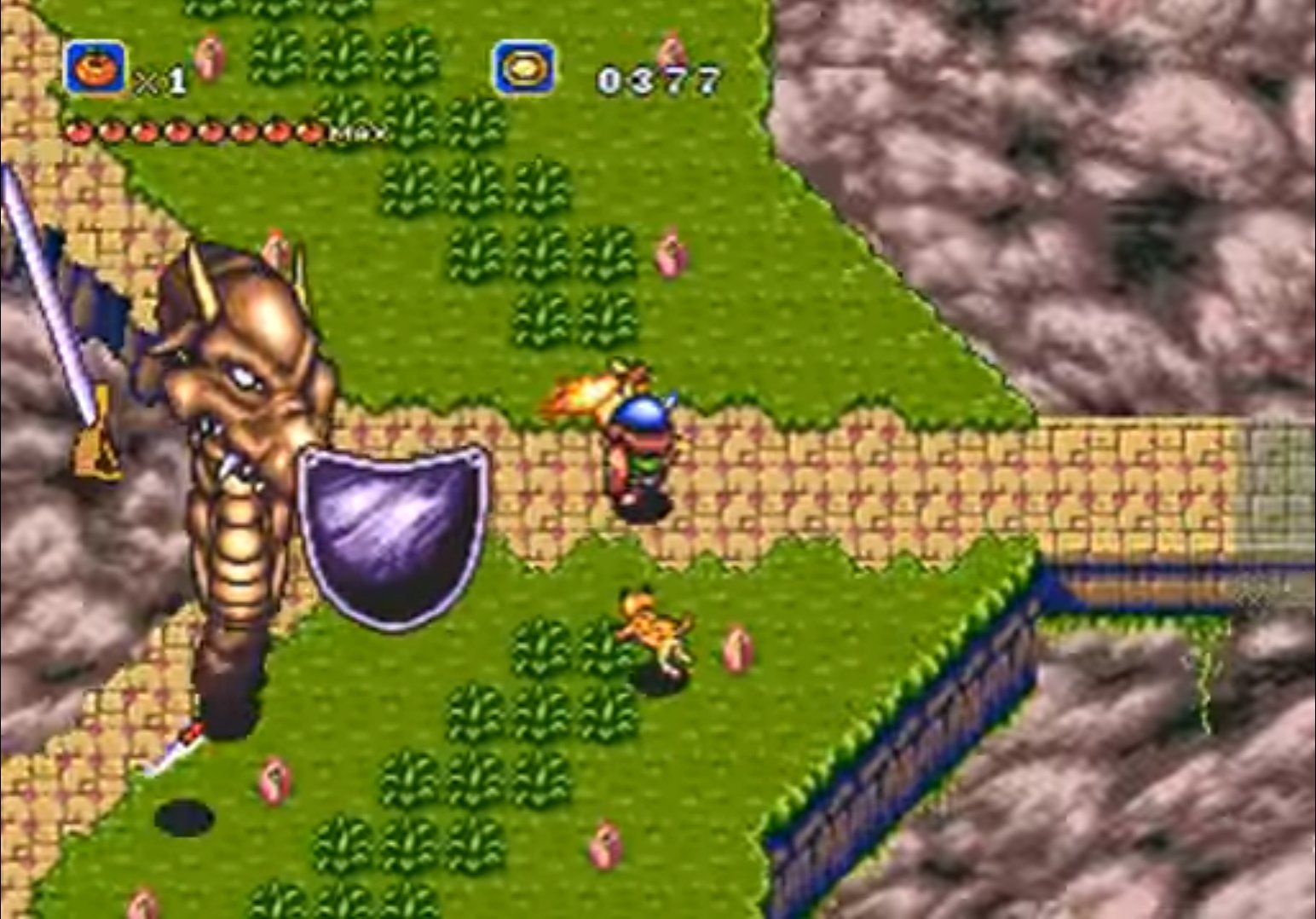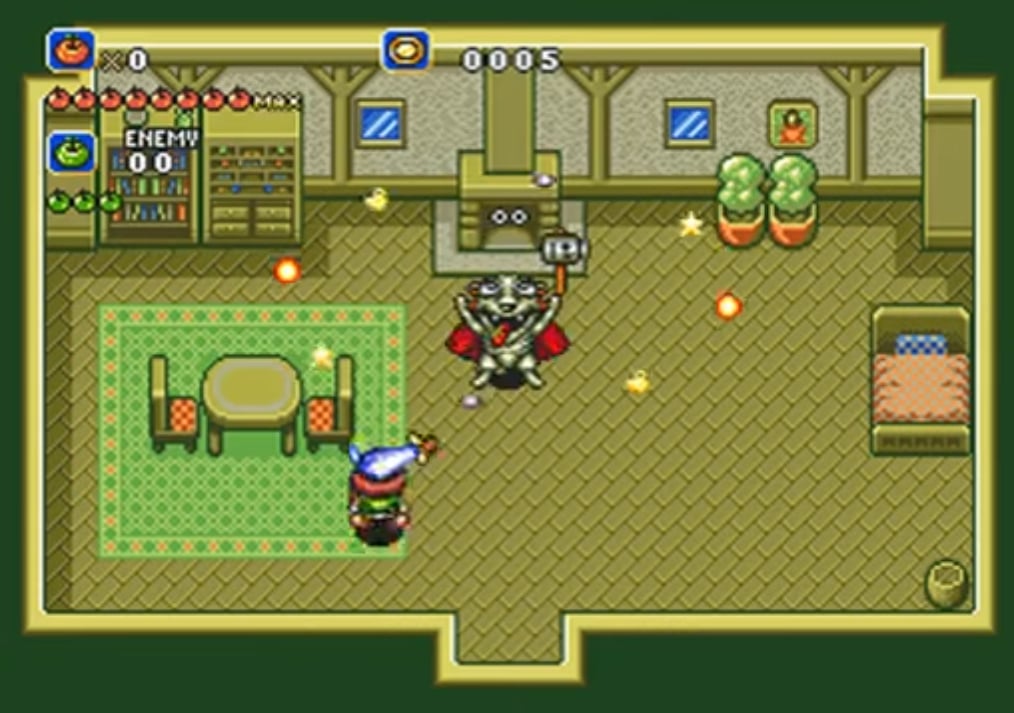In this three-part series, I’ll be looking at three of the most important Genesis RPGs that impacted my life. They may not be games you enjoyed, or even games you have even heard of. But for me, they were formative, and established my love of story-driven adventure gaming that still burns today.
***
When I think back to my Genesis years, it’s with a lot of fondness. There were some mediocre titles, sure, but I was a fairly savvy buyer even then, and I scoured the pages of gaming magazines fervently. Anything scored lower than 70% wouldn’t even get a glance from me. I was obsessed with RPGs — having migrated from text adventures — so when I spotted what looked to be a Zelda game on the Genesis in a copy of Sega Power, I was instantly transfixed.
I couldn’t glean much about it from the one-page article. It was covering the Japanese version (Ragnacenty) but it was colorful, had those huge font text boxes synonymous with pretty much any 90s RPG, and it looked like it could well be an excellent alternative to one of Nintendo’s finest series.
Like most games from that era, it cost a fortune — at least to a kid. I patiently waited for it make its way over to our little island, and breaking from tradition, didn’t bother reading the reviews. I just parted company with eighty bucks, knowing that it was going to be right up my alley.
Its name was Crusader of Centy, and it was the first game to make me cry.
OK, This Is DEFINITELY Similar To…
In fairness to the developer, Atlas, it didn’t really try to hide its inspiration. Crusader of Centy (or Soleil, as I knew it in the UK) wore its influence proudly, from the opening hour in which you’re given your father’s sword on your 14th birthday to the action-RPG mechanics. After reporting your special day to the king, you have to head to a training ground to learn about the game’s controls via an obstacle course.
The sword-swinging, grass-chopping, coin-collecting hero will seem awfully familiar to anyone who has ever experienced an adventure with Nintendo’s green-hatted chap, but there’s a great deal of comfort to be found in that similarity. Where the differences lay were in the story and your animal companions.
Shortly after your powwow with the king, you meet a fortune-teller who gives you the ability to speak to the local wildlife, but at the cost of your communication with humans. Your quest from then on is to try and track down the fortune-teller again and work out what has happened to you. It’s a fairly simplistic narrative initially, but it takes a tangential approach to A Link To The Past later on.
If I Could Talk To The Animals
Rather than taking the standard action-RPG approach of offering a progressively more powerful selection of different weapons to work your way through, Crusader of Centy takes the unique slant of allowing you to collect animals. Each animal imbues your sword — and you — with different powers, and their abilities are necessary to help you get through some of the game’s many puzzles.
For example, if you equip Cecil the lion on its own, you’ll be able to use a flame attack with your sword. However, if you also have the Dodo with you, the flames will stick to enemies and cause ongoing damage. Similarly, the Monarch butterfly will let you throw your sword and control its trajectory for a short time, but in combination with the Moa bird, you can unleash it and move it around indefinitely — perfect for navigating it around a maze to hit various switches.
Some of the animals are more useful than others, and since you can only use two animals at any given time, you will need to switch up your menagerie regularly in order to traverse puzzle areas with whatever sword abilities are required. It’s an interesting take on the genre, and since you accumulate new animals on a fairly frequent basis — with the puzzles they are used for coming soon after — the game continues to engage all the way to the end.
Who’s The Bad Guy, Really?
As you travel the world of Soleil, you’ll meet (and be attacked by) a variety of monsters. The design of them — especially the bosses — is distinctive. There’s little in the way of reskinning in the game, and the locations you’re taken to are equally interesting. A cloud city, a desert oasis, and a stormy ocean island are all on the agenda, with enemies which match their environments.
As you mash your way through boss after boss, dodging their signposted attacks and learning their patterns, more and more animals are freed to help you on your quest. Yet, at the heart of the cutesy slaughter lies a devastating conclusion. One of the final bosses you come across is Mother Monster, a literal beating heart who offers no resistance as you attack her. Just after you land the killing blow, she asks why you hate monsters so much — why can’t humans and monsters co-exist peacefully?
After that, the game piled on the pathos relentlessly, offering up friendly monster after friendly monster who talked rather than attacking. That was enough to tip my young mind over the edge and send me into blubsville.
I realized soon after that this had been spelled out for me right at the beginning. The three minute introduction which explained the reason for the monsters being on Earth (and the conflict that arose with humans) had been there every time I turned on the console.
Thankfully, everything gets resolved neatly at the end. You discover a way of altering the past, sending monsters back to the world which they accidentally arrived from. After that, you’re sent back in time too, and your dead father is now alive and well in Soleil, presumably because he didn’t get killed by monsters. Everyone is happy, and all is right with the world.
The icing on the the schmaltzy cake is a stroll through the forest during the end credits, where all of the animals you befriended on your journey accompany you. If Richard Curtis and Doctor Doolittle made a game, it would be Crusader of Centy.
Seems Simple
The cute graphics, engaging gameplay and bittersweet story can’t mask the fact that the game is very easy to beat — mainly because it was aimed at younger gamers. At one point, Sonic can be spotted on a beach, lounging on a deck chair, an odd and very obvious attempt to crowbar in Sega’s hero for the gratification of a juvenile audience.
As such, despite the box hilariously stating that it offered 60 hours of gameplay, I managed to get through it in less than eight. If you sped through it, you could plow through the game in less than three. It was a high price to pay for such a short game, but the way it affected me on an emotional level was something I’d never experienced before. The effect it had on me has stayed with me throughout my entire life.
Motokazu Shinoda can take a fair amount of the credit as he crafted a series of wonderful tracks for the game, including jaunty piano pieces in Rafflesia, the mysterious synth in Castle Freesia, the soothing lullaby of Animal Town and the emotive finale. Each piece worked perfectly, and although an orchestral version was never produced, it is still an incredibly catchy soundtrack.
***
Crusader of Centy never really got the credit it deserved for challenging the conventional “humans good, monsters bad” narrative prevalent in almost every RPG. For older gamers, it was a Zelda clone without the challenge. For the younger generation, it was perhaps too expensive. For those of us — like me — who happened upon it during the sweet spot of our formative years, it was a truly captivating game.
Did you play Crusader of Centy on the Genesis? What are your memories of it? Let me know in the comments!












Published: Jan 30, 2017 07:28 am